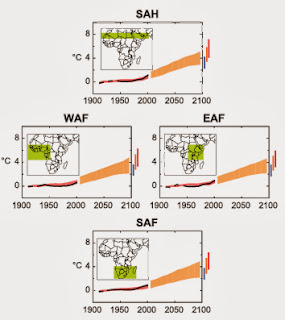According to the IPCC report, by 2020 in Africa, 75-250 million people will be exposed to water stress. This is all due to obvious climate change. Fruit and vegetation will be harder to access as well. With increasing water levels, the local food supplies would be affected negatively due to over-fishing. New studies have shown that Africa is one of the most vulnerable to climate change.
The six key points featured in the executive summary include many things that make it easier to understand the climate change in Africa. First, Africa is one of the most vulnerable climates to experience climate change. Second, African farmers have developed new ways to still be able to produce fruits and vegetables, while adapting to the changing climate. Third, agricultural production are going to be severely hurt by the changing climate. Fourth, water stress is very high, and in the places where water stress is not high, those places will become at risk. Fifth, with rising water levels, coastal areas will be affected. And lastly, health, which already is not at its best in Africa, will continue to deteriorate as the climate changes.
The most interesting threat to Sierra Leone, is the rising water levels, and this country being very close to the coast. Vegetation, and people occupy much of the land along the coast, therefore putting them right in the line of danger over the coming years. To support this, The IPCC report stated that up to 600 million people can be effected with rising water levels. Water levels will increase by 5-8 %.

I find it interesting that Africa is likely to experience more warming than the average global mean. It's scary that Africa is expected to get less precipitation than usual. I wonder if the United States will try to do anything to help them get fresh water.
ReplyDelete